BUSN09054: Leading with Knowledge - Essay on Management
VerifiedAdded on 2022/12/15
|11
|2438
|104
Essay
AI Summary
This essay provides an in-depth analysis of knowledge management principles, contrasting the concepts of process and practice within organizations. It explores the significance of both explicit and tacit knowledge, highlighting their roles in fostering innovation, employee motivation, and organizational success. The essay examines the advantages and disadvantages of knowledge management processes, emphasizing their impact on team alignment, productivity, and customer experiences. Furthermore, it applies these principles to the context of Tesco, discussing challenges related to knowledge management, such as balancing process, people, and technology, and motivating employees. The essay reviews knowledge management models, including the Gamble and Blackwell model, and critiques their operation, suggesting alternative approaches such as performance monitoring and dynamic linking. Ultimately, the essay concludes with a call for organizations to adopt a structured approach to knowledge management to achieve a competitive advantage and adapt to changing environments. The essay highlights the critical role of effective leadership in fostering a culture of knowledge sharing and continuous learning.

Essay
Paraphrase This Document
Need a fresh take? Get an instant paraphrase of this document with our AI Paraphraser
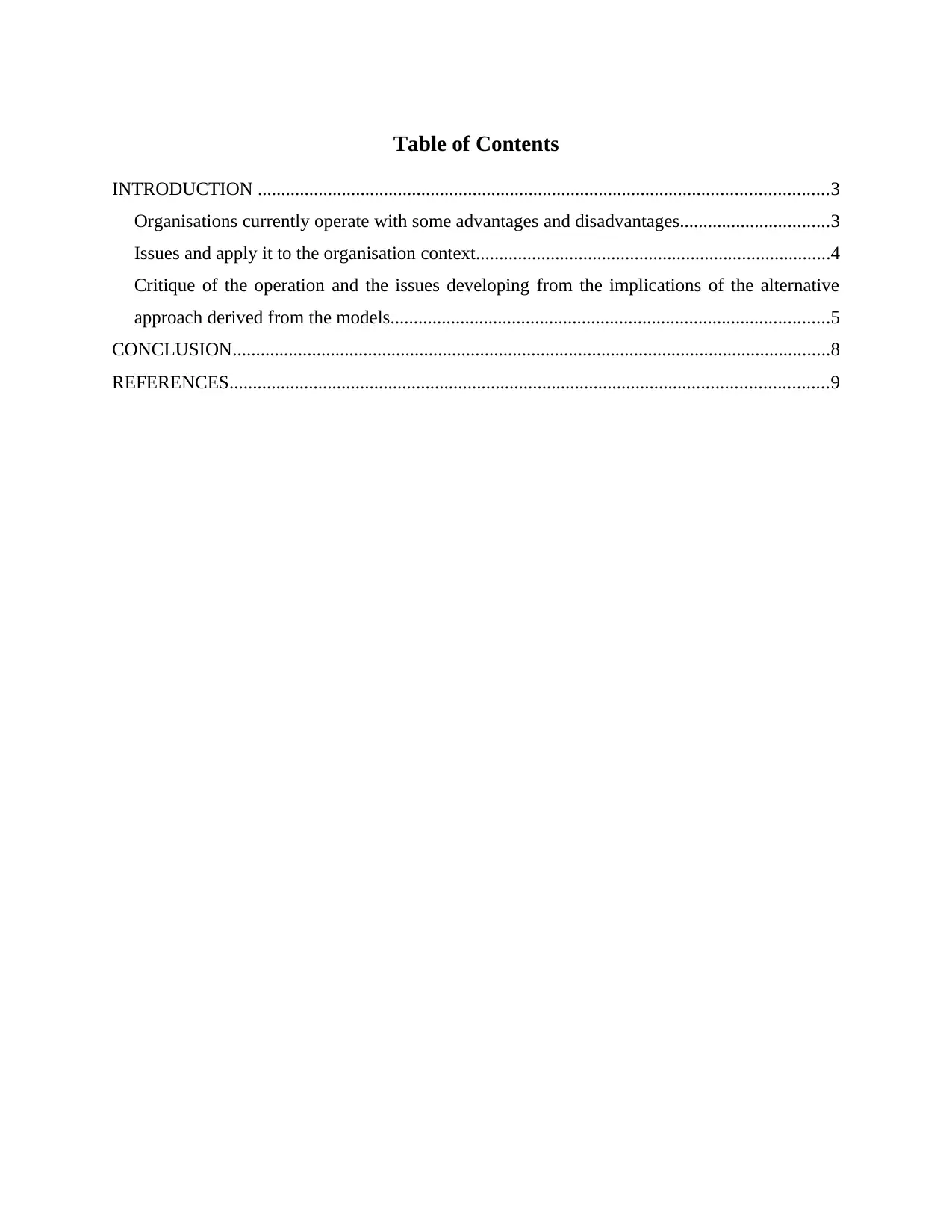
Table of Contents
INTRODUCTION ..........................................................................................................................3
Organisations currently operate with some advantages and disadvantages................................3
Issues and apply it to the organisation context............................................................................4
Critique of the operation and the issues developing from the implications of the alternative
approach derived from the models..............................................................................................5
CONCLUSION................................................................................................................................8
REFERENCES................................................................................................................................9
INTRODUCTION ..........................................................................................................................3
Organisations currently operate with some advantages and disadvantages................................3
Issues and apply it to the organisation context............................................................................4
Critique of the operation and the issues developing from the implications of the alternative
approach derived from the models..............................................................................................5
CONCLUSION................................................................................................................................8
REFERENCES................................................................................................................................9
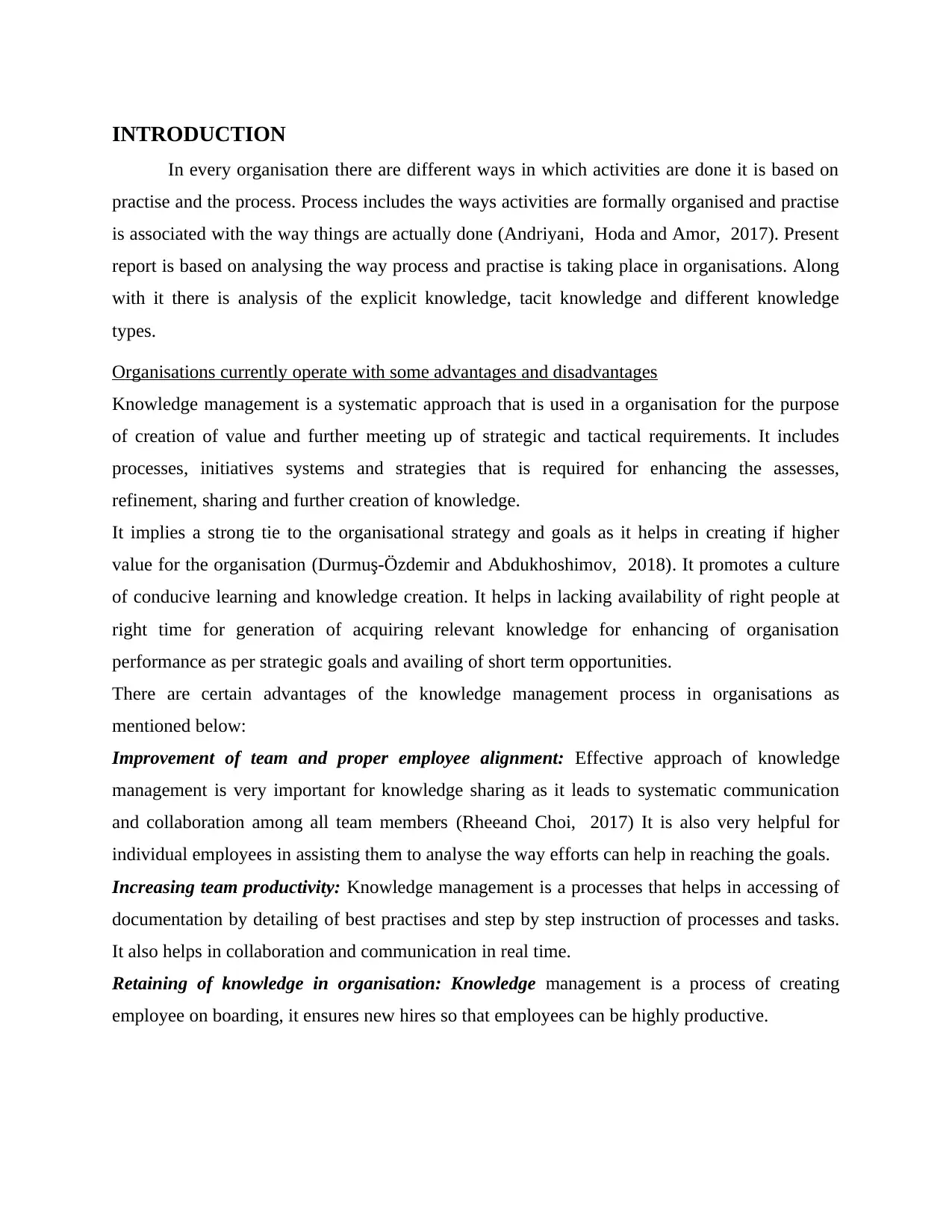
INTRODUCTION
In every organisation there are different ways in which activities are done it is based on
practise and the process. Process includes the ways activities are formally organised and practise
is associated with the way things are actually done (Andriyani, Hoda and Amor, 2017). Present
report is based on analysing the way process and practise is taking place in organisations. Along
with it there is analysis of the explicit knowledge, tacit knowledge and different knowledge
types.
Organisations currently operate with some advantages and disadvantages
Knowledge management is a systematic approach that is used in a organisation for the purpose
of creation of value and further meeting up of strategic and tactical requirements. It includes
processes, initiatives systems and strategies that is required for enhancing the assesses,
refinement, sharing and further creation of knowledge.
It implies a strong tie to the organisational strategy and goals as it helps in creating if higher
value for the organisation (Durmuş-Özdemir and Abdukhoshimov, 2018). It promotes a culture
of conducive learning and knowledge creation. It helps in lacking availability of right people at
right time for generation of acquiring relevant knowledge for enhancing of organisation
performance as per strategic goals and availing of short term opportunities.
There are certain advantages of the knowledge management process in organisations as
mentioned below:
Improvement of team and proper employee alignment: Effective approach of knowledge
management is very important for knowledge sharing as it leads to systematic communication
and collaboration among all team members (Rheeand Choi, 2017) It is also very helpful for
individual employees in assisting them to analyse the way efforts can help in reaching the goals.
Increasing team productivity: Knowledge management is a processes that helps in accessing of
documentation by detailing of best practises and step by step instruction of processes and tasks.
It also helps in collaboration and communication in real time.
Retaining of knowledge in organisation: Knowledge management is a process of creating
employee on boarding, it ensures new hires so that employees can be highly productive.
In every organisation there are different ways in which activities are done it is based on
practise and the process. Process includes the ways activities are formally organised and practise
is associated with the way things are actually done (Andriyani, Hoda and Amor, 2017). Present
report is based on analysing the way process and practise is taking place in organisations. Along
with it there is analysis of the explicit knowledge, tacit knowledge and different knowledge
types.
Organisations currently operate with some advantages and disadvantages
Knowledge management is a systematic approach that is used in a organisation for the purpose
of creation of value and further meeting up of strategic and tactical requirements. It includes
processes, initiatives systems and strategies that is required for enhancing the assesses,
refinement, sharing and further creation of knowledge.
It implies a strong tie to the organisational strategy and goals as it helps in creating if higher
value for the organisation (Durmuş-Özdemir and Abdukhoshimov, 2018). It promotes a culture
of conducive learning and knowledge creation. It helps in lacking availability of right people at
right time for generation of acquiring relevant knowledge for enhancing of organisation
performance as per strategic goals and availing of short term opportunities.
There are certain advantages of the knowledge management process in organisations as
mentioned below:
Improvement of team and proper employee alignment: Effective approach of knowledge
management is very important for knowledge sharing as it leads to systematic communication
and collaboration among all team members (Rheeand Choi, 2017) It is also very helpful for
individual employees in assisting them to analyse the way efforts can help in reaching the goals.
Increasing team productivity: Knowledge management is a processes that helps in accessing of
documentation by detailing of best practises and step by step instruction of processes and tasks.
It also helps in collaboration and communication in real time.
Retaining of knowledge in organisation: Knowledge management is a process of creating
employee on boarding, it ensures new hires so that employees can be highly productive.
⊘ This is a preview!⊘
Do you want full access?
Subscribe today to unlock all pages.

Trusted by 1+ million students worldwide
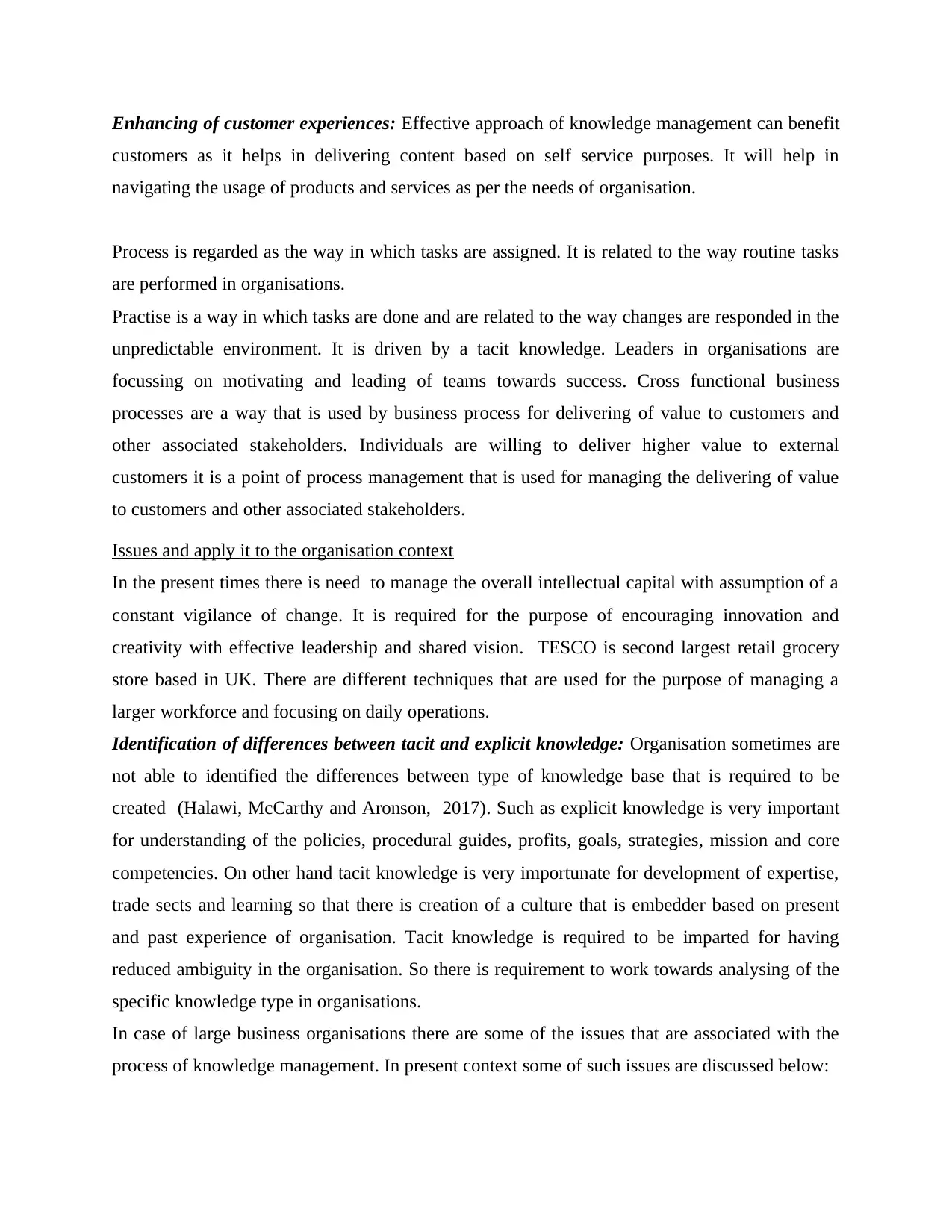
Enhancing of customer experiences: Effective approach of knowledge management can benefit
customers as it helps in delivering content based on self service purposes. It will help in
navigating the usage of products and services as per the needs of organisation.
Process is regarded as the way in which tasks are assigned. It is related to the way routine tasks
are performed in organisations.
Practise is a way in which tasks are done and are related to the way changes are responded in the
unpredictable environment. It is driven by a tacit knowledge. Leaders in organisations are
focussing on motivating and leading of teams towards success. Cross functional business
processes are a way that is used by business process for delivering of value to customers and
other associated stakeholders. Individuals are willing to deliver higher value to external
customers it is a point of process management that is used for managing the delivering of value
to customers and other associated stakeholders.
Issues and apply it to the organisation context
In the present times there is need to manage the overall intellectual capital with assumption of a
constant vigilance of change. It is required for the purpose of encouraging innovation and
creativity with effective leadership and shared vision. TESCO is second largest retail grocery
store based in UK. There are different techniques that are used for the purpose of managing a
larger workforce and focusing on daily operations.
Identification of differences between tacit and explicit knowledge: Organisation sometimes are
not able to identified the differences between type of knowledge base that is required to be
created (Halawi, McCarthy and Aronson, 2017). Such as explicit knowledge is very important
for understanding of the policies, procedural guides, profits, goals, strategies, mission and core
competencies. On other hand tacit knowledge is very importunate for development of expertise,
trade sects and learning so that there is creation of a culture that is embedder based on present
and past experience of organisation. Tacit knowledge is required to be imparted for having
reduced ambiguity in the organisation. So there is requirement to work towards analysing of the
specific knowledge type in organisations.
In case of large business organisations there are some of the issues that are associated with the
process of knowledge management. In present context some of such issues are discussed below:
customers as it helps in delivering content based on self service purposes. It will help in
navigating the usage of products and services as per the needs of organisation.
Process is regarded as the way in which tasks are assigned. It is related to the way routine tasks
are performed in organisations.
Practise is a way in which tasks are done and are related to the way changes are responded in the
unpredictable environment. It is driven by a tacit knowledge. Leaders in organisations are
focussing on motivating and leading of teams towards success. Cross functional business
processes are a way that is used by business process for delivering of value to customers and
other associated stakeholders. Individuals are willing to deliver higher value to external
customers it is a point of process management that is used for managing the delivering of value
to customers and other associated stakeholders.
Issues and apply it to the organisation context
In the present times there is need to manage the overall intellectual capital with assumption of a
constant vigilance of change. It is required for the purpose of encouraging innovation and
creativity with effective leadership and shared vision. TESCO is second largest retail grocery
store based in UK. There are different techniques that are used for the purpose of managing a
larger workforce and focusing on daily operations.
Identification of differences between tacit and explicit knowledge: Organisation sometimes are
not able to identified the differences between type of knowledge base that is required to be
created (Halawi, McCarthy and Aronson, 2017). Such as explicit knowledge is very important
for understanding of the policies, procedural guides, profits, goals, strategies, mission and core
competencies. On other hand tacit knowledge is very importunate for development of expertise,
trade sects and learning so that there is creation of a culture that is embedder based on present
and past experience of organisation. Tacit knowledge is required to be imparted for having
reduced ambiguity in the organisation. So there is requirement to work towards analysing of the
specific knowledge type in organisations.
In case of large business organisations there are some of the issues that are associated with the
process of knowledge management. In present context some of such issues are discussed below:
Paraphrase This Document
Need a fresh take? Get an instant paraphrase of this document with our AI Paraphraser
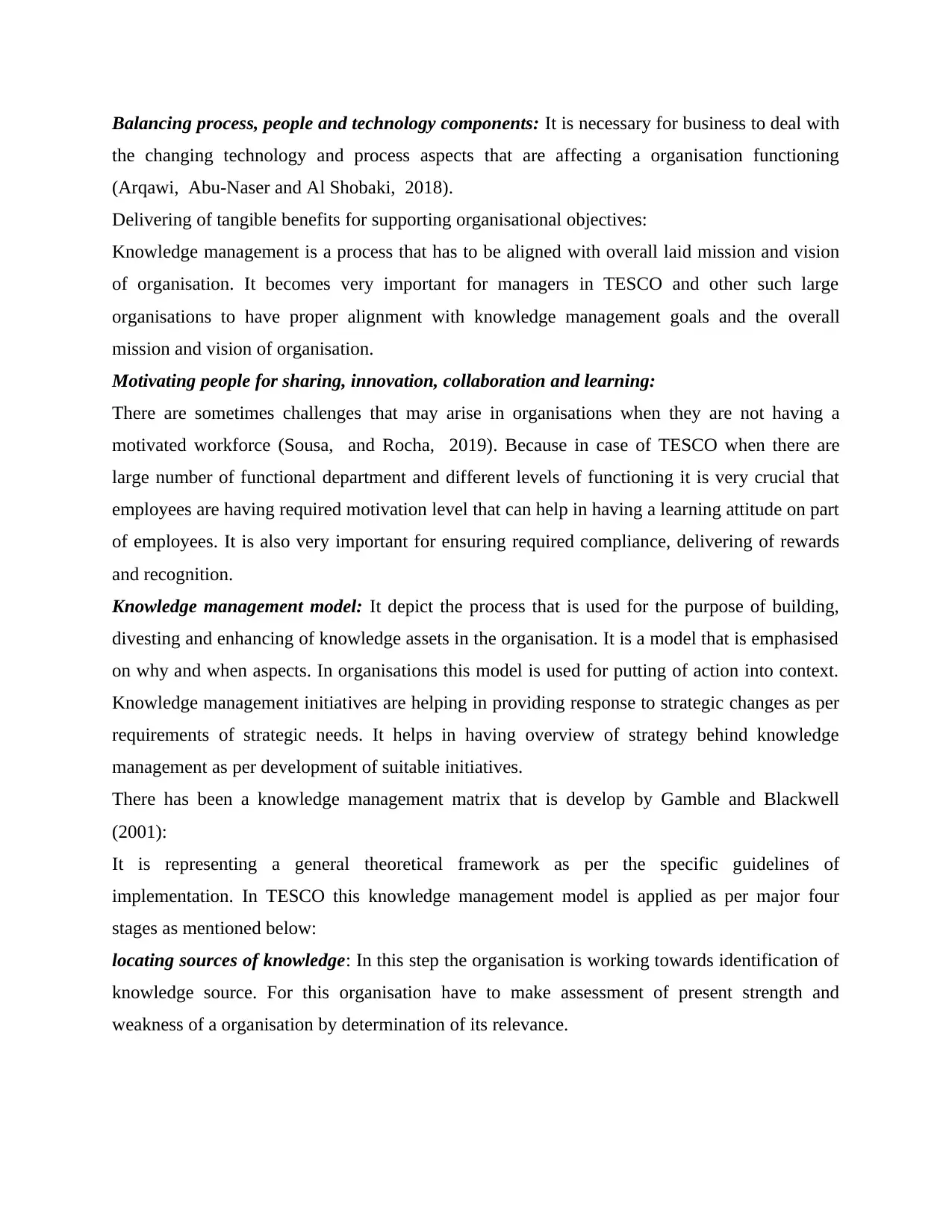
Balancing process, people and technology components: It is necessary for business to deal with
the changing technology and process aspects that are affecting a organisation functioning
(Arqawi, Abu-Naser and Al Shobaki, 2018).
Delivering of tangible benefits for supporting organisational objectives:
Knowledge management is a process that has to be aligned with overall laid mission and vision
of organisation. It becomes very important for managers in TESCO and other such large
organisations to have proper alignment with knowledge management goals and the overall
mission and vision of organisation.
Motivating people for sharing, innovation, collaboration and learning:
There are sometimes challenges that may arise in organisations when they are not having a
motivated workforce (Sousa, and Rocha, 2019). Because in case of TESCO when there are
large number of functional department and different levels of functioning it is very crucial that
employees are having required motivation level that can help in having a learning attitude on part
of employees. It is also very important for ensuring required compliance, delivering of rewards
and recognition.
Knowledge management model: It depict the process that is used for the purpose of building,
divesting and enhancing of knowledge assets in the organisation. It is a model that is emphasised
on why and when aspects. In organisations this model is used for putting of action into context.
Knowledge management initiatives are helping in providing response to strategic changes as per
requirements of strategic needs. It helps in having overview of strategy behind knowledge
management as per development of suitable initiatives.
There has been a knowledge management matrix that is develop by Gamble and Blackwell
(2001):
It is representing a general theoretical framework as per the specific guidelines of
implementation. In TESCO this knowledge management model is applied as per major four
stages as mentioned below:
locating sources of knowledge: In this step the organisation is working towards identification of
knowledge source. For this organisation have to make assessment of present strength and
weakness of a organisation by determination of its relevance.
the changing technology and process aspects that are affecting a organisation functioning
(Arqawi, Abu-Naser and Al Shobaki, 2018).
Delivering of tangible benefits for supporting organisational objectives:
Knowledge management is a process that has to be aligned with overall laid mission and vision
of organisation. It becomes very important for managers in TESCO and other such large
organisations to have proper alignment with knowledge management goals and the overall
mission and vision of organisation.
Motivating people for sharing, innovation, collaboration and learning:
There are sometimes challenges that may arise in organisations when they are not having a
motivated workforce (Sousa, and Rocha, 2019). Because in case of TESCO when there are
large number of functional department and different levels of functioning it is very crucial that
employees are having required motivation level that can help in having a learning attitude on part
of employees. It is also very important for ensuring required compliance, delivering of rewards
and recognition.
Knowledge management model: It depict the process that is used for the purpose of building,
divesting and enhancing of knowledge assets in the organisation. It is a model that is emphasised
on why and when aspects. In organisations this model is used for putting of action into context.
Knowledge management initiatives are helping in providing response to strategic changes as per
requirements of strategic needs. It helps in having overview of strategy behind knowledge
management as per development of suitable initiatives.
There has been a knowledge management matrix that is develop by Gamble and Blackwell
(2001):
It is representing a general theoretical framework as per the specific guidelines of
implementation. In TESCO this knowledge management model is applied as per major four
stages as mentioned below:
locating sources of knowledge: In this step the organisation is working towards identification of
knowledge source. For this organisation have to make assessment of present strength and
weakness of a organisation by determination of its relevance.
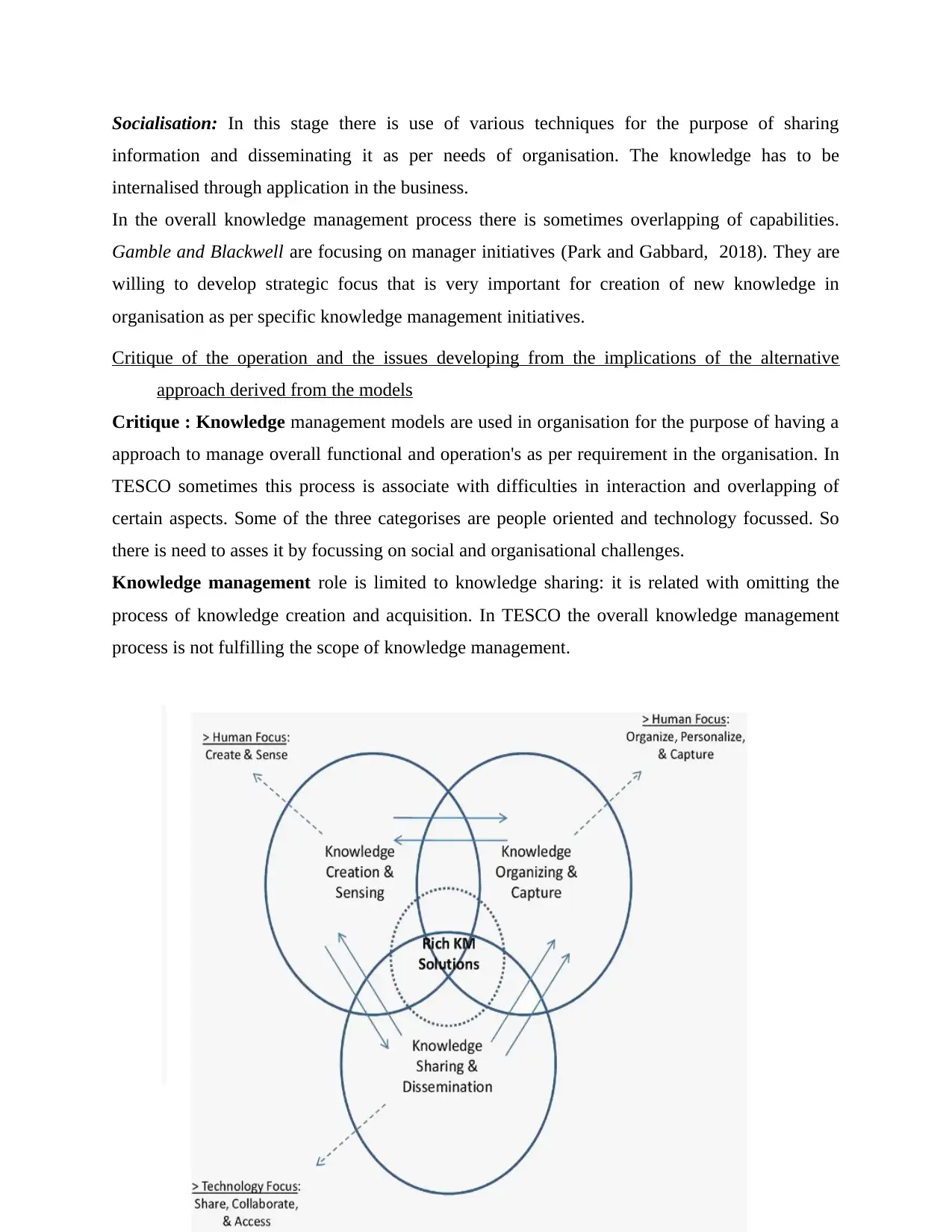
Socialisation: In this stage there is use of various techniques for the purpose of sharing
information and disseminating it as per needs of organisation. The knowledge has to be
internalised through application in the business.
In the overall knowledge management process there is sometimes overlapping of capabilities.
Gamble and Blackwell are focusing on manager initiatives (Park and Gabbard, 2018). They are
willing to develop strategic focus that is very important for creation of new knowledge in
organisation as per specific knowledge management initiatives.
Critique of the operation and the issues developing from the implications of the alternative
approach derived from the models
Critique : Knowledge management models are used in organisation for the purpose of having a
approach to manage overall functional and operation's as per requirement in the organisation. In
TESCO sometimes this process is associate with difficulties in interaction and overlapping of
certain aspects. Some of the three categorises are people oriented and technology focussed. So
there is need to asses it by focussing on social and organisational challenges.
Knowledge management role is limited to knowledge sharing: it is related with omitting the
process of knowledge creation and acquisition. In TESCO the overall knowledge management
process is not fulfilling the scope of knowledge management.
information and disseminating it as per needs of organisation. The knowledge has to be
internalised through application in the business.
In the overall knowledge management process there is sometimes overlapping of capabilities.
Gamble and Blackwell are focusing on manager initiatives (Park and Gabbard, 2018). They are
willing to develop strategic focus that is very important for creation of new knowledge in
organisation as per specific knowledge management initiatives.
Critique of the operation and the issues developing from the implications of the alternative
approach derived from the models
Critique : Knowledge management models are used in organisation for the purpose of having a
approach to manage overall functional and operation's as per requirement in the organisation. In
TESCO sometimes this process is associate with difficulties in interaction and overlapping of
certain aspects. Some of the three categorises are people oriented and technology focussed. So
there is need to asses it by focussing on social and organisational challenges.
Knowledge management role is limited to knowledge sharing: it is related with omitting the
process of knowledge creation and acquisition. In TESCO the overall knowledge management
process is not fulfilling the scope of knowledge management.
⊘ This is a preview!⊘
Do you want full access?
Subscribe today to unlock all pages.

Trusted by 1+ million students worldwide
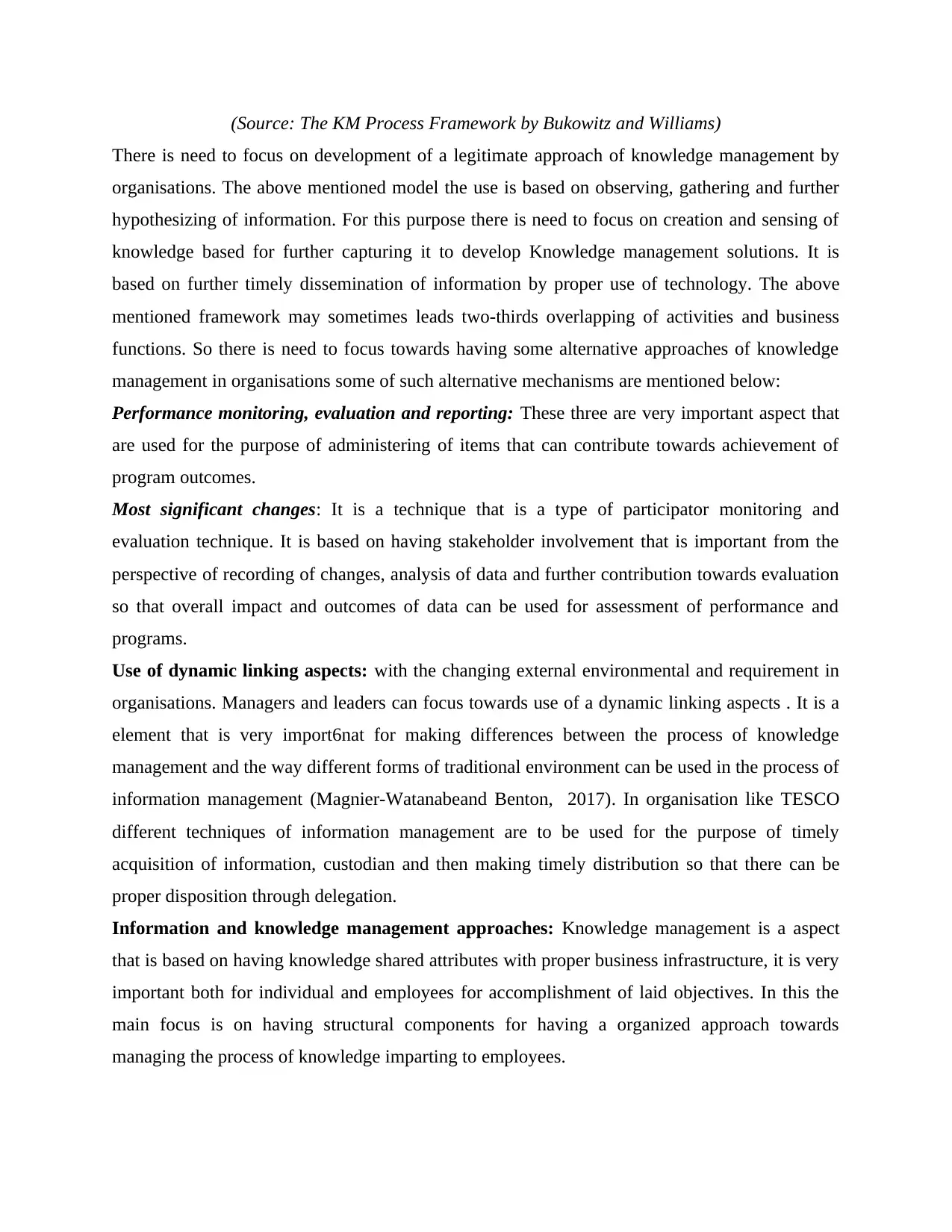
(Source: The KM Process Framework by Bukowitz and Williams)
There is need to focus on development of a legitimate approach of knowledge management by
organisations. The above mentioned model the use is based on observing, gathering and further
hypothesizing of information. For this purpose there is need to focus on creation and sensing of
knowledge based for further capturing it to develop Knowledge management solutions. It is
based on further timely dissemination of information by proper use of technology. The above
mentioned framework may sometimes leads two-thirds overlapping of activities and business
functions. So there is need to focus towards having some alternative approaches of knowledge
management in organisations some of such alternative mechanisms are mentioned below:
Performance monitoring, evaluation and reporting: These three are very important aspect that
are used for the purpose of administering of items that can contribute towards achievement of
program outcomes.
Most significant changes: It is a technique that is a type of participator monitoring and
evaluation technique. It is based on having stakeholder involvement that is important from the
perspective of recording of changes, analysis of data and further contribution towards evaluation
so that overall impact and outcomes of data can be used for assessment of performance and
programs.
Use of dynamic linking aspects: with the changing external environmental and requirement in
organisations. Managers and leaders can focus towards use of a dynamic linking aspects . It is a
element that is very import6nat for making differences between the process of knowledge
management and the way different forms of traditional environment can be used in the process of
information management (Magnier-Watanabeand Benton, 2017). In organisation like TESCO
different techniques of information management are to be used for the purpose of timely
acquisition of information, custodian and then making timely distribution so that there can be
proper disposition through delegation.
Information and knowledge management approaches: Knowledge management is a aspect
that is based on having knowledge shared attributes with proper business infrastructure, it is very
important both for individual and employees for accomplishment of laid objectives. In this the
main focus is on having structural components for having a organized approach towards
managing the process of knowledge imparting to employees.
There is need to focus on development of a legitimate approach of knowledge management by
organisations. The above mentioned model the use is based on observing, gathering and further
hypothesizing of information. For this purpose there is need to focus on creation and sensing of
knowledge based for further capturing it to develop Knowledge management solutions. It is
based on further timely dissemination of information by proper use of technology. The above
mentioned framework may sometimes leads two-thirds overlapping of activities and business
functions. So there is need to focus towards having some alternative approaches of knowledge
management in organisations some of such alternative mechanisms are mentioned below:
Performance monitoring, evaluation and reporting: These three are very important aspect that
are used for the purpose of administering of items that can contribute towards achievement of
program outcomes.
Most significant changes: It is a technique that is a type of participator monitoring and
evaluation technique. It is based on having stakeholder involvement that is important from the
perspective of recording of changes, analysis of data and further contribution towards evaluation
so that overall impact and outcomes of data can be used for assessment of performance and
programs.
Use of dynamic linking aspects: with the changing external environmental and requirement in
organisations. Managers and leaders can focus towards use of a dynamic linking aspects . It is a
element that is very import6nat for making differences between the process of knowledge
management and the way different forms of traditional environment can be used in the process of
information management (Magnier-Watanabeand Benton, 2017). In organisation like TESCO
different techniques of information management are to be used for the purpose of timely
acquisition of information, custodian and then making timely distribution so that there can be
proper disposition through delegation.
Information and knowledge management approaches: Knowledge management is a aspect
that is based on having knowledge shared attributes with proper business infrastructure, it is very
important both for individual and employees for accomplishment of laid objectives. In this the
main focus is on having structural components for having a organized approach towards
managing the process of knowledge imparting to employees.
Paraphrase This Document
Need a fresh take? Get an instant paraphrase of this document with our AI Paraphraser
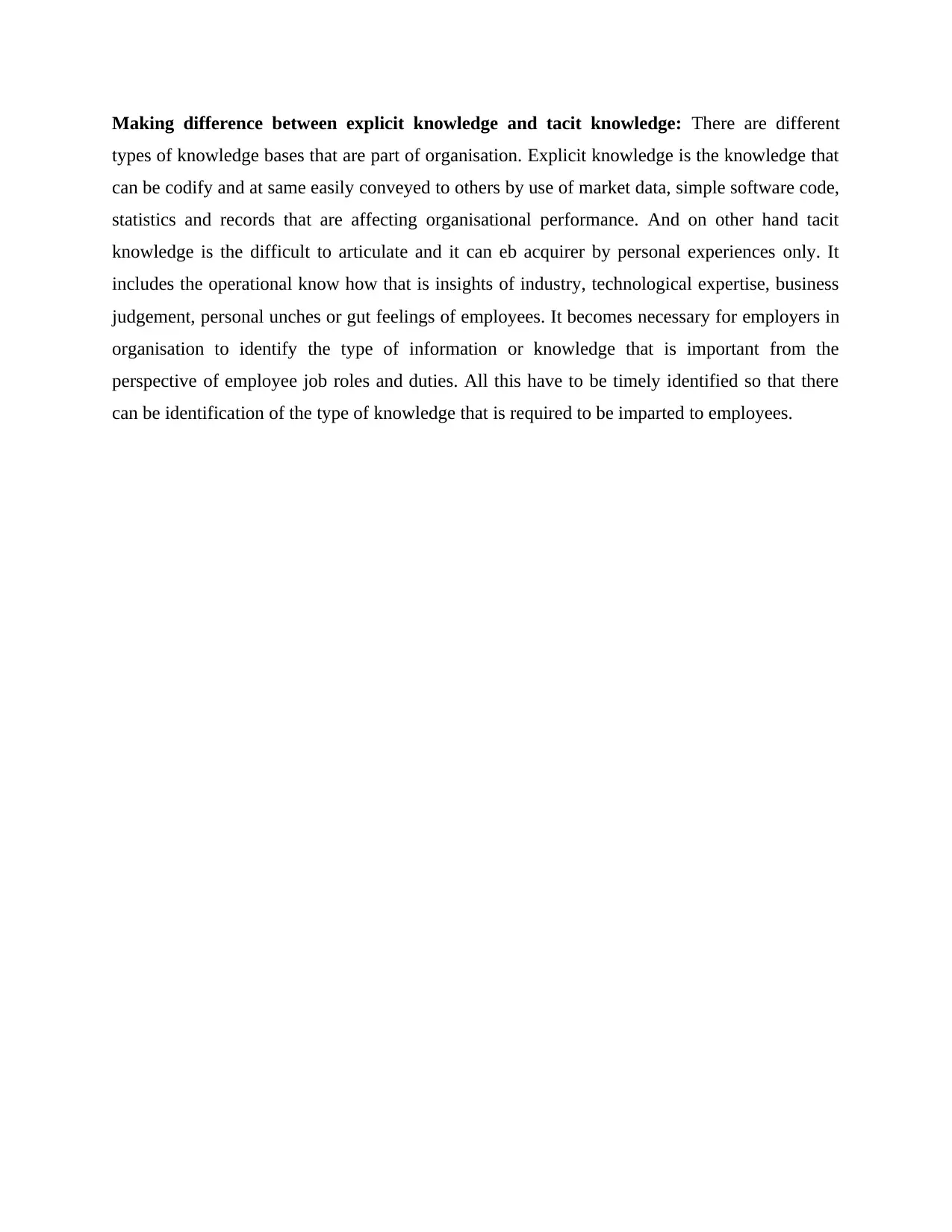
Making difference between explicit knowledge and tacit knowledge: There are different
types of knowledge bases that are part of organisation. Explicit knowledge is the knowledge that
can be codify and at same easily conveyed to others by use of market data, simple software code,
statistics and records that are affecting organisational performance. And on other hand tacit
knowledge is the difficult to articulate and it can eb acquirer by personal experiences only. It
includes the operational know how that is insights of industry, technological expertise, business
judgement, personal unches or gut feelings of employees. It becomes necessary for employers in
organisation to identify the type of information or knowledge that is important from the
perspective of employee job roles and duties. All this have to be timely identified so that there
can be identification of the type of knowledge that is required to be imparted to employees.
types of knowledge bases that are part of organisation. Explicit knowledge is the knowledge that
can be codify and at same easily conveyed to others by use of market data, simple software code,
statistics and records that are affecting organisational performance. And on other hand tacit
knowledge is the difficult to articulate and it can eb acquirer by personal experiences only. It
includes the operational know how that is insights of industry, technological expertise, business
judgement, personal unches or gut feelings of employees. It becomes necessary for employers in
organisation to identify the type of information or knowledge that is important from the
perspective of employee job roles and duties. All this have to be timely identified so that there
can be identification of the type of knowledge that is required to be imparted to employees.
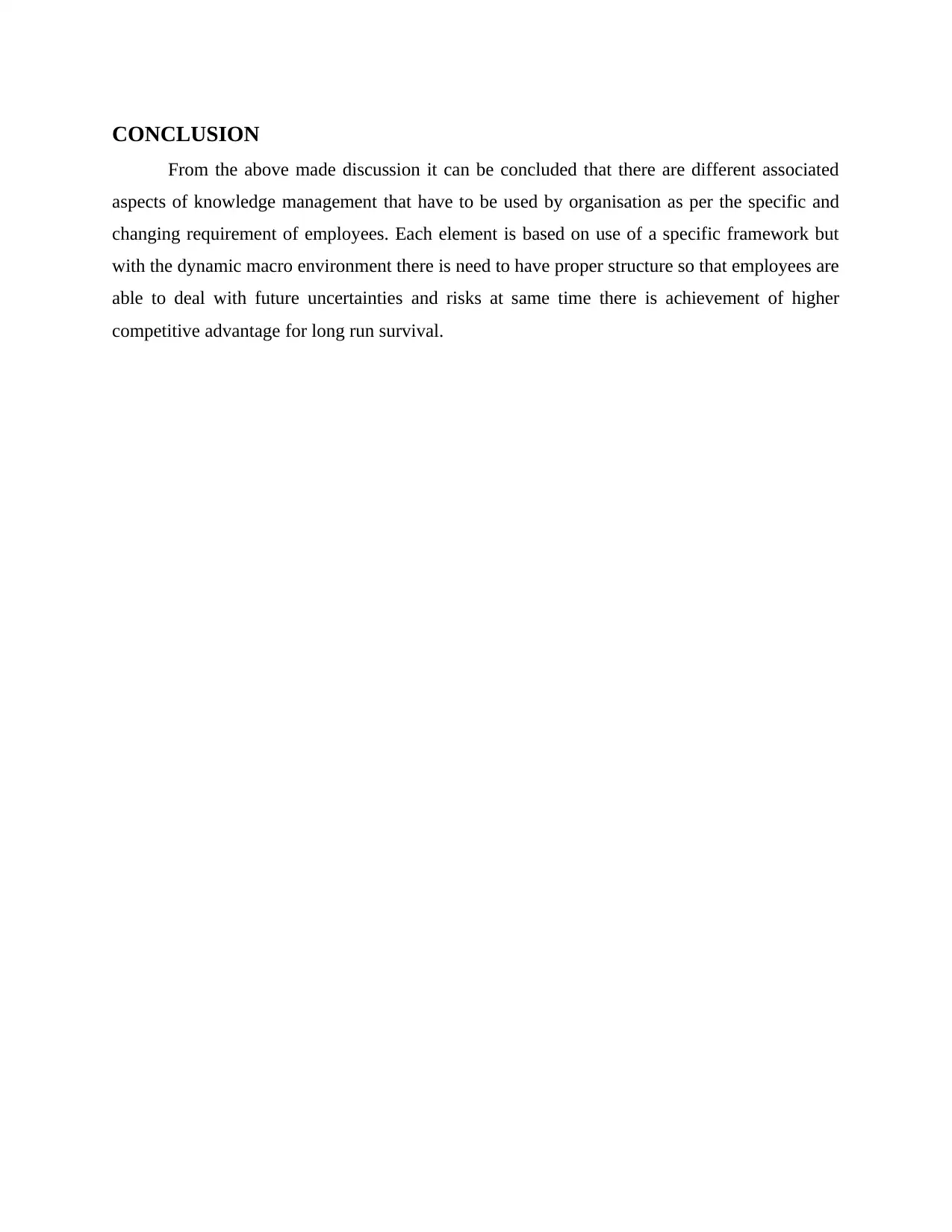
CONCLUSION
From the above made discussion it can be concluded that there are different associated
aspects of knowledge management that have to be used by organisation as per the specific and
changing requirement of employees. Each element is based on use of a specific framework but
with the dynamic macro environment there is need to have proper structure so that employees are
able to deal with future uncertainties and risks at same time there is achievement of higher
competitive advantage for long run survival.
From the above made discussion it can be concluded that there are different associated
aspects of knowledge management that have to be used by organisation as per the specific and
changing requirement of employees. Each element is based on use of a specific framework but
with the dynamic macro environment there is need to have proper structure so that employees are
able to deal with future uncertainties and risks at same time there is achievement of higher
competitive advantage for long run survival.
⊘ This is a preview!⊘
Do you want full access?
Subscribe today to unlock all pages.

Trusted by 1+ million students worldwide
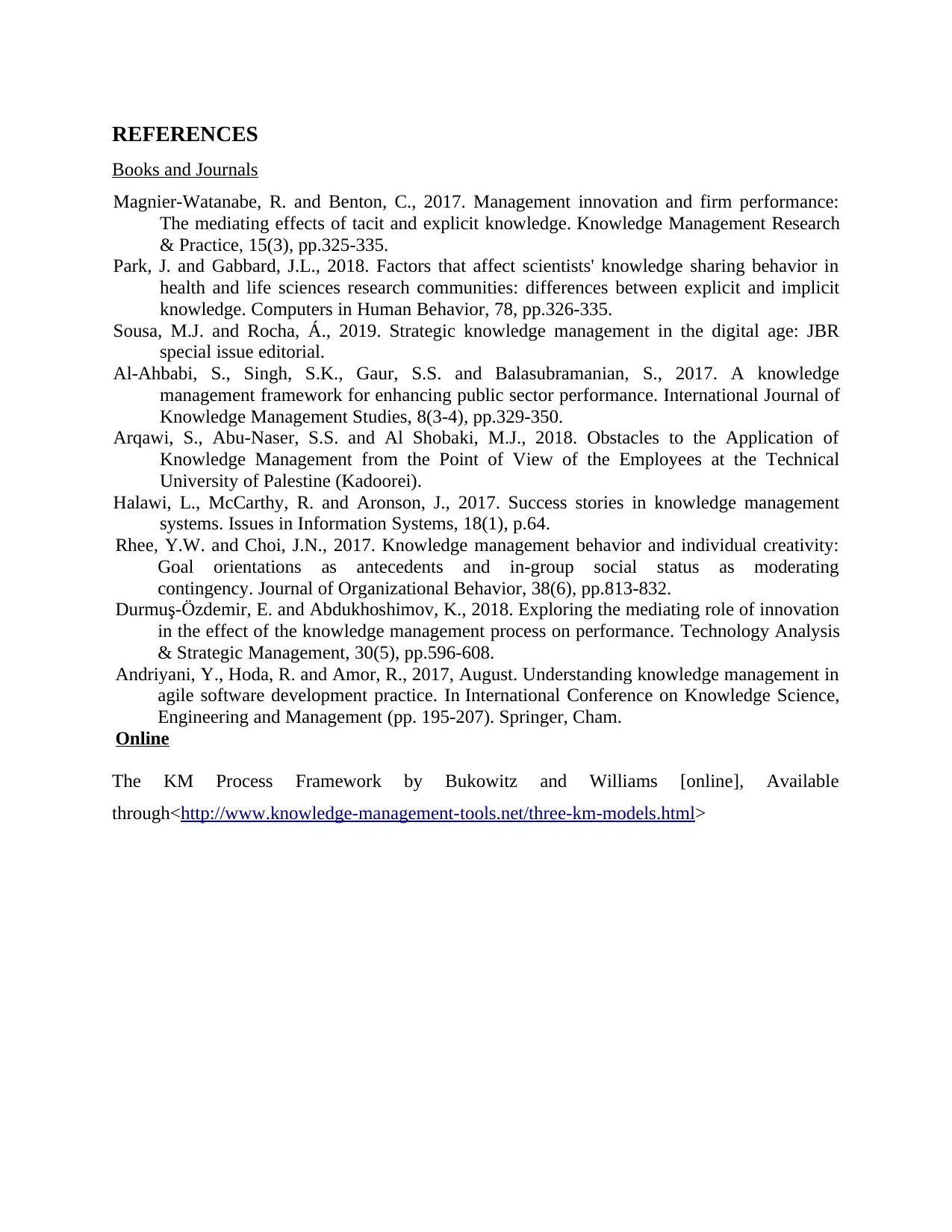
REFERENCES
Books and Journals
Magnier-Watanabe, R. and Benton, C., 2017. Management innovation and firm performance:
The mediating effects of tacit and explicit knowledge. Knowledge Management Research
& Practice, 15(3), pp.325-335.
Park, J. and Gabbard, J.L., 2018. Factors that affect scientists' knowledge sharing behavior in
health and life sciences research communities: differences between explicit and implicit
knowledge. Computers in Human Behavior, 78, pp.326-335.
Sousa, M.J. and Rocha, Á., 2019. Strategic knowledge management in the digital age: JBR
special issue editorial.
Al-Ahbabi, S., Singh, S.K., Gaur, S.S. and Balasubramanian, S., 2017. A knowledge
management framework for enhancing public sector performance. International Journal of
Knowledge Management Studies, 8(3-4), pp.329-350.
Arqawi, S., Abu-Naser, S.S. and Al Shobaki, M.J., 2018. Obstacles to the Application of
Knowledge Management from the Point of View of the Employees at the Technical
University of Palestine (Kadoorei).
Halawi, L., McCarthy, R. and Aronson, J., 2017. Success stories in knowledge management
systems. Issues in Information Systems, 18(1), p.64.
Rhee, Y.W. and Choi, J.N., 2017. Knowledge management behavior and individual creativity:
Goal orientations as antecedents and in‐group social status as moderating
contingency. Journal of Organizational Behavior, 38(6), pp.813-832.
Durmuş-Özdemir, E. and Abdukhoshimov, K., 2018. Exploring the mediating role of innovation
in the effect of the knowledge management process on performance. Technology Analysis
& Strategic Management, 30(5), pp.596-608.
Andriyani, Y., Hoda, R. and Amor, R., 2017, August. Understanding knowledge management in
agile software development practice. In International Conference on Knowledge Science,
Engineering and Management (pp. 195-207). Springer, Cham.
Online
The KM Process Framework by Bukowitz and Williams [online], Available
through<http://www.knowledge-management-tools.net/three-km-models.html>
Books and Journals
Magnier-Watanabe, R. and Benton, C., 2017. Management innovation and firm performance:
The mediating effects of tacit and explicit knowledge. Knowledge Management Research
& Practice, 15(3), pp.325-335.
Park, J. and Gabbard, J.L., 2018. Factors that affect scientists' knowledge sharing behavior in
health and life sciences research communities: differences between explicit and implicit
knowledge. Computers in Human Behavior, 78, pp.326-335.
Sousa, M.J. and Rocha, Á., 2019. Strategic knowledge management in the digital age: JBR
special issue editorial.
Al-Ahbabi, S., Singh, S.K., Gaur, S.S. and Balasubramanian, S., 2017. A knowledge
management framework for enhancing public sector performance. International Journal of
Knowledge Management Studies, 8(3-4), pp.329-350.
Arqawi, S., Abu-Naser, S.S. and Al Shobaki, M.J., 2018. Obstacles to the Application of
Knowledge Management from the Point of View of the Employees at the Technical
University of Palestine (Kadoorei).
Halawi, L., McCarthy, R. and Aronson, J., 2017. Success stories in knowledge management
systems. Issues in Information Systems, 18(1), p.64.
Rhee, Y.W. and Choi, J.N., 2017. Knowledge management behavior and individual creativity:
Goal orientations as antecedents and in‐group social status as moderating
contingency. Journal of Organizational Behavior, 38(6), pp.813-832.
Durmuş-Özdemir, E. and Abdukhoshimov, K., 2018. Exploring the mediating role of innovation
in the effect of the knowledge management process on performance. Technology Analysis
& Strategic Management, 30(5), pp.596-608.
Andriyani, Y., Hoda, R. and Amor, R., 2017, August. Understanding knowledge management in
agile software development practice. In International Conference on Knowledge Science,
Engineering and Management (pp. 195-207). Springer, Cham.
Online
The KM Process Framework by Bukowitz and Williams [online], Available
through<http://www.knowledge-management-tools.net/three-km-models.html>
Paraphrase This Document
Need a fresh take? Get an instant paraphrase of this document with our AI Paraphraser

1 out of 11
Related Documents
Your All-in-One AI-Powered Toolkit for Academic Success.
+13062052269
info@desklib.com
Available 24*7 on WhatsApp / Email
![[object Object]](/_next/static/media/star-bottom.7253800d.svg)
Unlock your academic potential
Copyright © 2020–2026 A2Z Services. All Rights Reserved. Developed and managed by ZUCOL.





